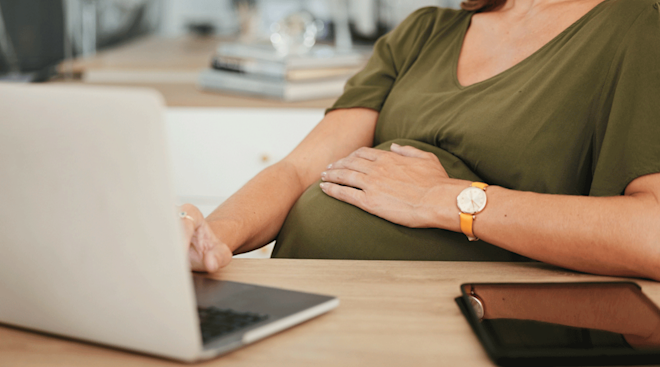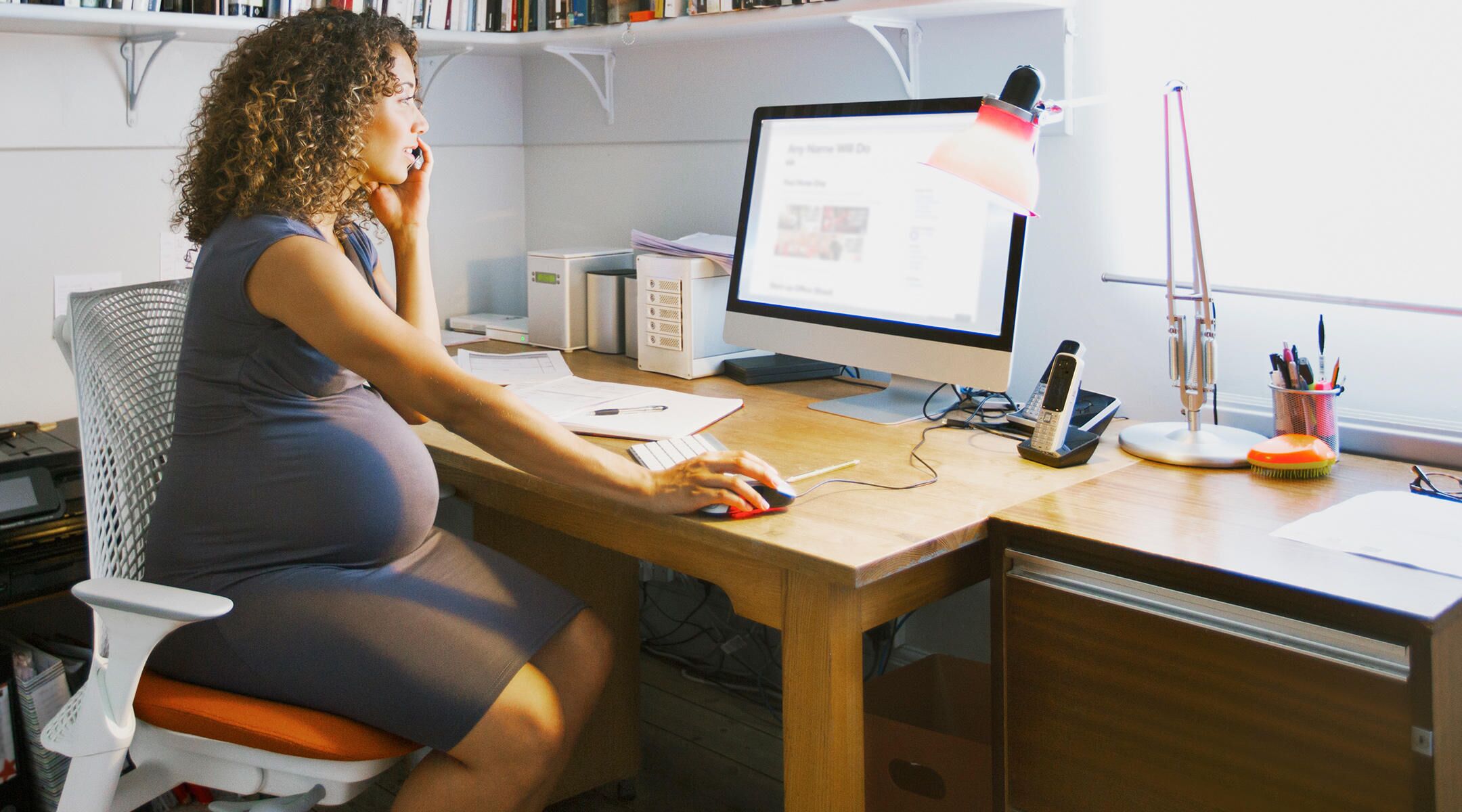The 9 Worst Things About Being Pregnant at Work, According to Moms Who’ve Been There
Sure, the initial flood of congratulations you get after announcing your pregnancy at work is great and all, but the day-to-day reality of growing a human while juggling the 9-to-5 grind? That’s a whole other story. Between sprints to the toilet, unsolicited bump touching and all those tummy-churnin’ lunchtime smells, being pregnant at work is not exactly the all-glow experience you might have expected. Worried? Don’t be! Here’s your guide to navigating the most common complaints with the help of been-there-conquered-that working moms just like you.
If you’re trying to wait until the second trimester to share the big news, that means you’ve got roughly 12+ weeks of creative storytelling to do. Suddenly, you’re all about empire-waist dresses, eating your bland carb-heavy lunches alone in your office and skipping happy hours. And the Oscar for Best Performance in a Workplace Drama goes to… all the pregnant ladies!
“I hated pretending I wasn’t pregnant for 10+ weeks. I was nauseous and poisoned with hormones during my first trimester, trying to pretend that I was just fine at work. It was terrible,” says Natalie N., mom of two in New York City. “I coped by taking my misery out on my husband—and crying!”
Meghan M., a mom of one in Toronto had a different strategy: “I became a master of misdirection,” she says. “I was always holding a giant coffee cup—decaf—and loudly blaming my nausea on last night’s takeout.”
Another option: Scope out at least one trusted workplace ally who knows what’s really going on. Not only can they help cover for you during emergency puke breaks, but having someone at work who knows what you’re going through can also make you feel less alone.
Research shows about 70 percent of moms-to-be experience morning sickness. So, yeah, the odds aren’t in your favor. And, spoiler, the “morning” in “morning sickness” is a full-on farce. That icky, pukey, hurling feeling can happen at any time—like in the middle of a meeting or during your now-dreaded lunch hour.
“I had terrible all-day sickness, which was bad enough. Then, one day, we had a special baked potato bar at work. The smell of chili and bacon wafting through the cubicles made me so ill. I spent most of my day in the bathroom,” recalls Rachel S., a mom of four in Morrice, Michigan. Mom-of-two, Madeleine D. in Fairfax, Virginia can relate: “I had a colleague who insisted on microwaving fish! I had to stop eating lunch at work.”
Moreover, what makes it worse is that morning sickness tends to occur early on in pregnancy—before you’ve let the cat out of the bag at work. “Many times, women have to struggle in silence,” says Renita White, MD, an ob-gyn in Atlanta.
Fortunately, there are some ways to curb morning sickness. Eating in the morning and having small amounts of soothing foods throughout the day can help reduce nausea, advises Sherry Ross, MD, an ob-gyn and women’s health expert in Santa Monica, California. And, if necessary, talk to your doctor about medications that might help
You might be aware that you’ll need to urinate more often when expecting, thanks to the one-two punch of pregnancy hormones and your growing uterus putting the squeeze on your bladder. But that’s not all! According to research, there’s also a 50/50 chance you’ll also leak urine between trips to the bathroom. Good times, right?
Since you can’t make the last stall to the right your office for nine months, try this instead:
- Switch to decaf. Caffeine, your fave co-worker, is a diuretic, meaning it increases urine production—so sip with caution.
- Wear the pads. Just suck it up and wear a dang pad or special leak-proof underwear.
- Don’t try to hold it. When you feel the first tinge of an urge to pee, go to the bathroom. Never wait. In the middle of a meeting? Don’t worry. A simple one-finger up and an “excuse me” works wonders. No one questions a pregnant person’s bathroom needs.
- Don’t rush. There’s no need to flush and run—your meeting can wait. Instead, double void: Stay seated for an extra 30 seconds, lean forward then straight, stand for a quick shimmy and sit once more. This trick gets those last dribbles out and buys you more time between runs.
Finally, maybe keep a pair of just-in-case undies in your desk drawer.
Ever find yourself staring at your computer, completely blanking on what you were about to type? Welcome to pregnancy brain! “It hit me hard,” says Lilit A., a mom of two in Los Angeles. “There I was, a psychologist who’s supposed to be on top of all my clients’ stories, and suddenly I’d forget their name mid-session!”
Strike a nerve? That’s not surprising given that data shows that up to 80 percent of women report memory and thinking problems during pregnancy thanks to those pesky hormones—estrogen and progesterone.
The best way to navigate pregnancy brain fog? Get plenty of rest (don’t laugh), stay nourished with filling and satisfying eats, set phone and calendar reminders for everything and invest in sticky notes.
In the end, you likely can’t eliminate these cognitive hiccups entirely, but you can learn to roll with them. As Ellen M., a mom of one in Austin, reminds us: “Sometimes life forces you to slow down, and this is one of those times. For all you type-A folks out there, we need to accept that we’re human and no one gets through pregnancy without making mistakes at work.”
Unsolicited advice and comments from randos is one thing (“No, I’m not expecting twins, thank you, dude at the checkout!”), but dealing with colleagues’ hot takes is a different story. The questions and comments can range from awkwardly personal to downright inappropriate—and some doozies cross every possible line: “I had a female coworker who would ask how my nipples were doing!” says Gigi A., parent of one child in Hartford, Connecticut.
And the comments just keep coming. “The things my coworker and boss said to me during pregnancy were absolutely wild!" recalls Mary, mom of one in Dallas. “Even the CEO walked by my desk one day and said ‘Wow, you sure do look pregnant.’”
What’s more, the seemingly innocent check-ins can become overwhelming too. “The repetitive ‘How are yous?’ really got to me,” says Flic H., mom of one in Manchester, England. “People expect a positive response—as if pregnancy could be anything but marvelous. Instead of the polite ‘I’m good, thanks,’ I wanted to tell the truth: ‘I can’t sleep, my clothes don’t fit and I have no appetite but constant heartburn.’”
Courtney C., parent of one in Long Beach, California, took a more approach to combatting unwanted commentary. “I hated when my coworkers said anything about my body, so I simply started saying ‘No body comments, please.’ It worked!”
It’s beyond exhausting growing a human. Just ask the 94 percent of women surveyed who suffered from fatigue during all three trimesters of pregnancy. Since hibernation is not an option (we looked into it),you’ll need to find an acceptable way to cope. For Courtney—our Long Beach mom—the solution was simple: She’d nap in her car during her lunch break. “It was a win-win, because I didn’t have to deal with gross lunch smells either.”
When a midday snooze isn’t an option, try taking short, frequent breaks to move your body during your workday—and keep the physical activity going outside of work too. “I was lucky—my boss was a seasoned parent who knew the deal,” says Nicole D., mom of one in New York City. “She made some meetings optional, and even encouraged me to take breaks when needed. I took prenatal yoga classes, which really helped with the fatigue. A body in motion stays in motion, right? Even if that pregnant body can’t stay up to watch TV after work!”
“Commuting to work can be a traumatic experience, whether you’re pregnant or not,” says Ross. But commuting while pregnant definitely transforms your daily trek into a special kind of torture. Between the nausea, backaches, swollen ankles and bone-deep exhaustion, even a short journey feels like an epic quest. And if you’re riding public transportation, well, that’s a whole new level of awful.
“Commuting on the train during my first trimester was the worst,” says New York City mom, Nicole. “I was tired and not feeling 100 percent, but I still didn’t look pregnant, so no one gave up their seat.” Even when your belly pops, there’s no guarantee a grumpy commuter will sacrifice their spot.
Driving to work? That’s a different set of struggles. For safety, buckle your lap belt below your belly, as advised by the American College of Obstetricians and Gynecologists (ACOG), so it fits snugly across your hips and pelvis, and make sure the shoulder strap is nestled between your growing chest and over the mid-portion of your collar bone—away from your neck.
“When I was pregnant, work was 95 percent remote, which was helpful. But those occasional in-person days? Pure anxiety,” recalls Sherry R., parent of one in New York City. “I once had a work trip where I had to put together 10 whole outfits that would hide my emerging belly. Stressful!”
Let’s be real—attempting to look quasi-professional while your body rapidly morphs brings all new meaning to the term “fast fashion!” (There are only so many wrap and muumuu dresses you can rock.) And don’t think the wardrobe stress ends once everyone at work knows you’re expecting. That’s why Brooklyn mom-of-one, Ashley R. rented her entire maternity wardrobe. “It helped me keep my closet fresh every month, changing with the seasons and my body,” she says. “But the best part was that renting really helped me feel comfortable in my changing body at the office.”
Unless you’ve got a planned induction or C-section, it’s anyone’s guess when baby will make their grand entrance. I, for one, spent my last month of pregnancy mentally rehearsing escape routes from every meeting room. Would I have to waddle-run past the office assistant, water-breakage in progress? Could I make it down four flights if the elevator was out? The thought of going into labor during our weekly all-hands—or, my goodness, delivering the baby in the communal bathroom—haunted my dreams.
The good news? Your colleagues are probably just as anxious about an impromptu office birth as you are. Moreover, they should be empathetic to this possibility, says Ross.
Finally, keep in mind that the start of labor is rarely as dramatic as they make it out to be in the movies, so in all likelihood, you won’t randomly start screaming in pain or suddenly gush amniotic fluid.
Here’s the deal: Growing a human while growing your career isn’t exactly easy-breezy. But with some strategic planning, a sense of humor and maybe a desk drawer full of oyster crackers and panty liners, you can navigate these next few months. Consider it practice for what’s ahead—because balancing work and parenthood? That’s when the real juggling act begins.
Plus, more from The Bump:
Sherry Ross, MD, FACOG, is a board-certified ob-gyn and women's health expert based at Providence Saint John’s Health Center in Santa Monica, California. She is also the author of She-ology: The Definitive Guide to Women's Intimate Health. Period. She earned her medical degree from New York Medical College.
Renita White, MD, FACOG, is a board-certified obstetrician and gynecologist at Georgia Obstetrics and Gynecology in Atlanta and Alpharetta, Georgia. She earned her medical degree from The Ohio State University College of Medicine.
Cleveland Clinic, Morning Sickness: Nausea and Vomiting in Pregnancy
Health and Quality of Life Outcomes, Urinary incontinence in pregnant women and its impact on health-related quality of life, Jan. 2022
National Association for Continence, Dribbling After Urinating: Why It Happens ad What to Do About It
American Psychological Association, Priming for a new role, 2008
Handbook of Clinical Neurology, Neurophysiological and cognitive changes in pregnancy, 2020
Sleep Science, Fatigue and sleep quality in different trimesters of pregnancy, Jan. 2021
American College of Obstetricians and Gynecologists (ACOG), Car Seafety for Pregnant Women, Babies, Children
Learn how we ensure the accuracy of our content through our editorial and medical review process.
Navigate forward to interact with the calendar and select a date. Press the question mark key to get the keyboard shortcuts for changing dates.




















































